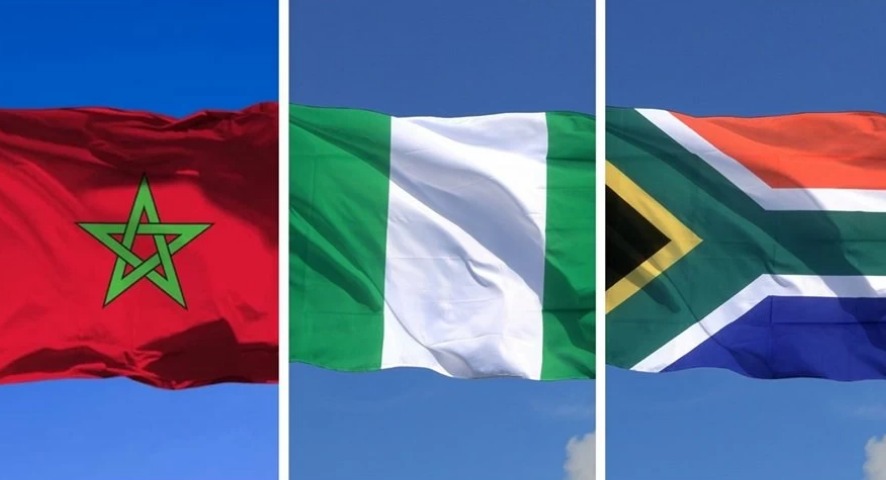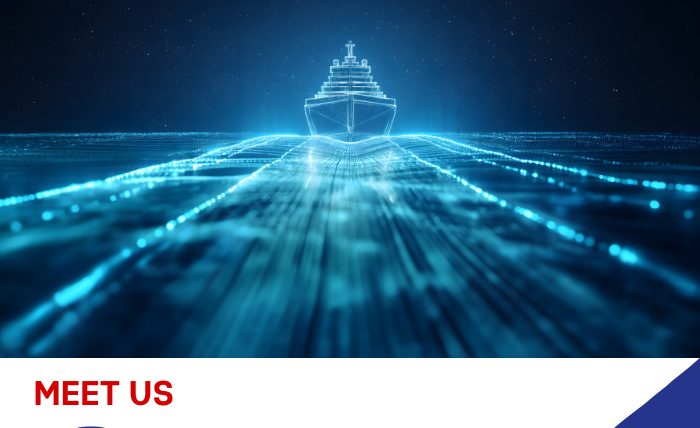As the 2025 edition of the Annual Report on the Geopolitics of Africa (8th edition), published by the Moroccan think tank Policy Center for the New South (PCNS), outlines a striking overview of continental changes, one section stands out: Atlantic Africa. This latest edition, led by Abdelhak Bassou, explores how African states are adapting to the shifting sands of global geopolitics—highlighting the emergence of a long-marginalized strategic space.
Atlantic Africa, placed at the heart of Morocco’s Royal Initiative of November 2023, is given a dedicated section in the report. Six chapters analyze this geopolitical frontier—from Cape Verde’s role in Atlantic security to unlocking the Sahel region, and from energy geopolitics to continental shelf expansion in the Gulf of Guinea. But it is Chapter 6, authored by Driss Alaoui Belghiti and Fatim Zohra Azouzou, that poses the central question:
“The Morocco–Nigeria–South Africa Axis: A Geopolitical Driver for Atlantic African Integration?”
Three Atlantic Visions for One Ocean
The analysis highlights a complex reality in which three regional powers—Morocco, Nigeria, and South Africa—pursue distinct Atlantic strategies, “sometimes complementary, often competitive.” These trajectories reflect a reshaped geoeconomy and diverging regional power plays.
Morocco is portrayed as offering the most structured vision of an integrated African Atlantic. It was the first country to propose an African perspective on the Atlantic, deploying a diplomacy rooted in solidarity, regional prosperity, and a maritime-driven model of regional integration.
Morocco’s approach evolved in three phases:
- Initially, while outside the African Union, Morocco strengthened bilateral ties, especially with states in its historic sphere of influence.
- In the second phase, it adopted economic diplomacy, building new alliances based on shared economic interests with moderate African states (i.e., moderate on the Western Sahara issue).
- The third phase, post-reintegration into the African Union, focused on multilateral cooperation, as seen in its 2017 application to join ECOWAS.
Nigeria: A Coastal Power in Search of Sovereignty
Nigeria follows a radically different path. Since independence, its foreign policy has been Afrocentric, aiming for continental leadership. For Abuja, the Atlantic is primarily a space of energy security and sovereignty.
Nigeria’s approach has two key pillars:
- Ensuring security in the Gulf of Guinea through autonomous African governance.
- Using its Atlantic coast to diversify its economy.
Concrete actions include:
- The Yaoundé Code of Conduct (2013) for regional maritime security.
- The “Deep Blue” project (2021), strengthening maritime surveillance with ships, drones, and anti-piracy units.
South Africa: Between Maritime Duality and Strategic Caution
South Africa, straddling the Indian and Atlantic Oceans, presents a dual maritime identity. Historically more Indian Ocean-oriented, Pretoria is increasingly awakening to the Atlantic’s potential.
With 1,500 km of Atlantic coastline and a vast exclusive economic zone rich in fish and energy resources, South Africa launched Operation Phakisa in 2014, modeled on Malaysia’s experience, to unlock blue economy growth.
However, Pretoria remains cautious toward Morocco’s initiative due to geopolitical divergences and historic alliances—notably over the Western Sahara.
Functional Convergences, Political Divergences
Despite differing strategies, the three powers share functional interests in Atlantic Africa in three areas:
- Maritime Security: A de facto “division of labor” exists—Nigeria as regulator in the central-west Atlantic, Morocco projecting into the northwest, and South Africa anchoring the global South.
- Logistics: A tri-hub corridor could emerge—Tanger Med (North), Lagos–Lekki (Center), Durban–Cape Town (South). But without harmonized standards and infrastructure, this remains latent.
- Energy Integration: The Morocco–Nigeria gas pipeline is emblematic of asymmetric cooperation, linking 13 West African countries over 5,600 km. It positions Morocco as an energy bridge to Europe and reinforces Nigeria’s centrality in ECOWAS. While not a participant, South Africa could still play a future role via renewable energy expertise.
Obstacles: Rivalries and Distrust
Nonetheless, deeper integration is hindered by:
- Leadership rivalries
- Conflicting geopolitical visions
- Diplomatic legacies, especially the Western Sahara dispute.
South Africa’s support for the Polisario Front contrasts sharply with Morocco’s position of full sovereignty over its southern provinces. This is not merely diplomatic disagreement, but a clash of international legitimacy narratives, complicating strategic cooperation.
Toward an “Archipelagic Regionalism”?
Faced with fragmentation, the authors suggest an alternative model: “functional archipelagic regionalism.” Rather than relying on territorial continuity, this would connect coastal sub-regions (Maghreb, West, Central, and Southern Africa) via shared oceanic strategies.
The ASEAN model is a useful reference—having built maritime cooperation in the South China Sea without a single political hub.
Strategic Benefits of Atlantic Integration
Each power would gain:
- Morocco: enhanced Africa–Europe gateway status and deeper West African integration.
- Nigeria: better protection of critical infrastructure and value from offshore energy.
- South Africa: diversification of partnerships beyond BRICS into a new African maritime framework.
More broadly, Atlantic integration would reposition West Africa as a launchpad toward the Americas, the Caribbean, and Southern Europe—transforming the African Atlantic from a zone of external exploitation into one of collective sovereignty.
A Strategic Imperative for Africa
The report concludes that an African Atlantic architecture cannot rely solely on bilateral or unilateral efforts. What’s needed is an inclusive, minilateral framework, built around shared interests and norms.
According to Belghiti and Azouzou, the Atlantic presents a unique opportunity to reshape Africa’s geopolitical center, assert maritime sovereignty, and amplify its voice in global ocean governance.
Uniting Morocco, Nigeria, and South Africa under a common Atlantic vision isn’t just a technical adjustment—it is a strategic imperative for embedding Africa in the emerging global maritime order.
If these powers can move beyond historical divisions, the African Atlantic could shift from a fragmented periphery into a unifying geopolitical frontier.




